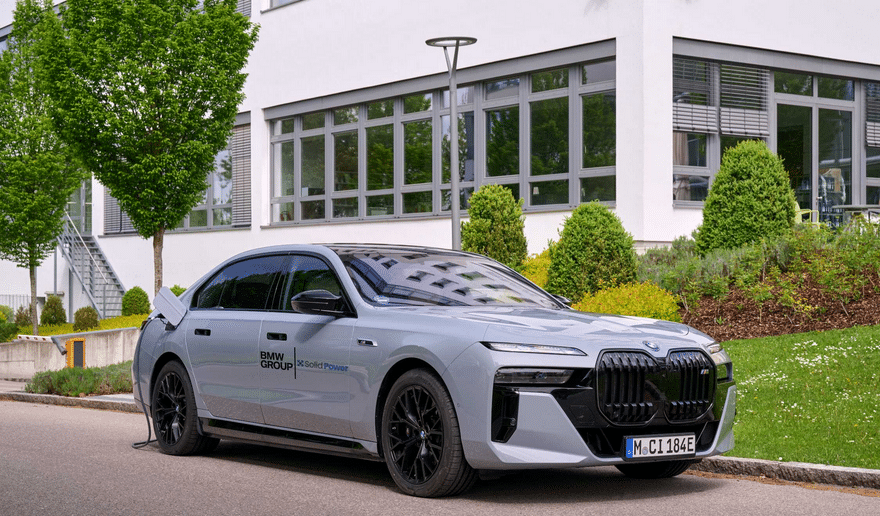BMW, Solid Power Testing All-Solid-State Battery in a BMW I7
In May 2025, the BMW Group announced a significant milestone in its battery innovation strategy: the integration of large-format, pure all-solid-state battery (ASSB) cells—developed in collaboration with Solid Power—into a BMW i7 test vehicle. This vehicle is now operating in the Munich area in Germany, marking the next phase in BMW’s exploration of ASSB technology. Compared to conventional lithium-ion batteries, ASSB cells promise much higher energy density in a more compact format, potentially enabling longer vehicle range without increasing overall battery weight. The current integration leverages the BMW Group’s Gen5 module structure while introducing new approaches for managing cell behavior, including expansion control, pressure regulation, and thermal dynamics.
This step builds on the strategic partnership between BMW and Solid Power that began in 2022, when the companies entered into a technology transfer agreement to accelerate ASSB development. The solid-state cells used in the BMW i7 feature sulfide-based electrolytes and represent one of the industry’s most advanced iterations of ASSB technology. Through this collaboration, Solid Power produced the cells while BMW contributed critical expertise in system integration, design optimization, and testing. The results from this ongoing trial will yield crucial insights into the performance and durability of ASSBs under real-world driving conditions, particularly how the new chemistry responds to stress factors like temperature variation and vehicle dynamics.
Martin Schuster, Vice President Battery Cell and Cell Module at the BMW Group, says: “Our BMW i7 ASSB test vehicle on the road is a perfect example of the BMW Group’s technology-open mindset. We are continuously advancing the development of new battery cell technologies and are constantly expanding our know-how with valuable partners such as Solid Power. ”

“Solid Power is extremely proud that our partnership with BMW has resulted in the first demonstration of truly all-solid-state battery cells in a vehicle,” said John Van Scoter, President and Chief Executive Officer of Solid Power. “We believe in the promise of ASSB’s and continue to drive innovation of our sulfide electrolyte in support of that future for EV’s.”
BMW has long prioritized internal battery expertise as a foundation for its electrification goals. Its Battery Cell Competence Center (BCCC) in Munich and Cell Manufacturing Competence Center (CMCC) in Parsdorf serve as hubs for R&D, where BMW now operates its own solid-state prototype line under license from Solid Power. These in-house capabilities, combined with a global network of 300 innovation partners, underscore BMW’s strategy of maintaining control over the full battery value chain while co-developing breakthrough technologies. The collaboration with Solid Power exemplifies this vision, positioning the BMW Group to lead the next wave of electric mobility through genuine, scalable ASSB integration.
What All-Solid-State Battery (ASSB) Technology Means for EV Adoption
The rise of electric vehicles has reshaped the global auto industry, but one factor continues to dominate the conversation: the battery. While lithium-ion batteries have powered the EV revolution thus far, a new class of energy storage—all-solid-state batteries (ASSBs)—could dramatically accelerate adoption by overcoming many of today’s technical and practical limitations.
ASSBs replace the liquid or gel electrolyte used in conventional lithium-ion cells with a solid electrolyte. This change brings with it a host of potential benefits, most notably higher energy density, enhanced safety, and longer lifespan. With a higher energy density, EVs powered by ASSBs could travel much farther on a single charge—reducing range anxiety and making electric vehicles more attractive to mainstream consumers. Some developers estimate that ASSBs could offer up to twice the energy density of today’s best lithium-ion batteries in the same physical footprint.
Safety is another key advantage. The solid electrolytes used in ASSBs are non-flammable and more stable than traditional lithium batteries, significantly lowering the risk of thermal runaway or fire. This makes them ideal for high-demand applications like electric trucks, buses, and aircraft, and gives consumers greater peace of mind. Today’s EV batteries are very safe, EVs are less likely to catch fire than gas-powered cars.
For automakers, the impact of ASSBs goes beyond raw performance numbers. These batteries could simplify packaging and thermal management, reduce overall vehicle weight, and even enable faster charging times—all while potentially reducing long-term maintenance needs. But as with any breakthrough, challenges remain. Manufacturing solid-state batteries at scale, ensuring uniform performance across large cell formats, and bringing costs down to commercially viable levels are hurdles still being addressed.
Nonetheless, recent moves by companies like BMW, Toyota, and Solid Power suggest progress is accelerating. Test vehicles are already hitting the road, signaling that ASSBs are no longer confined to the lab. If these early trials translate into commercial success, ASSBs could mark a turning point—not just for EVs, but for how we power all forms of transportation in the future.
ASSB technology promises to remove some of the final barriers to mass EV adoption, combining longer range, better safety, and improved durability. As the technology matures and economies of scale kick in, it could become the catalyst that shifts EVs from early majority to true mass-market dominance.

Electric Vehicle Marketing Consultant, Writer and Editor. Publisher EVinfo.net.
Services